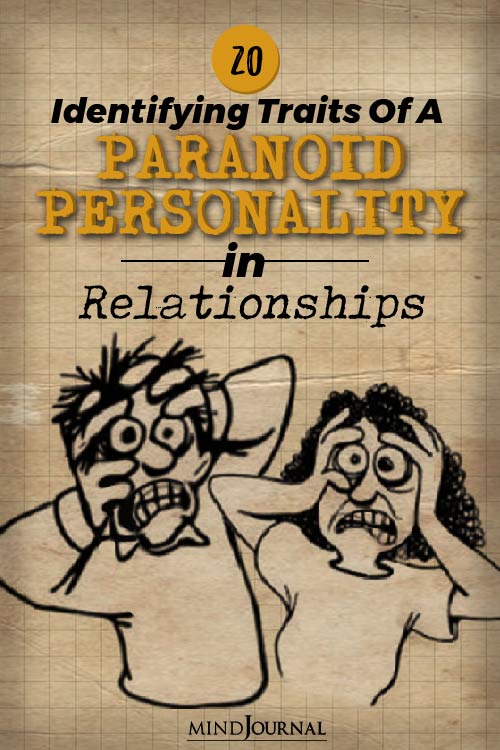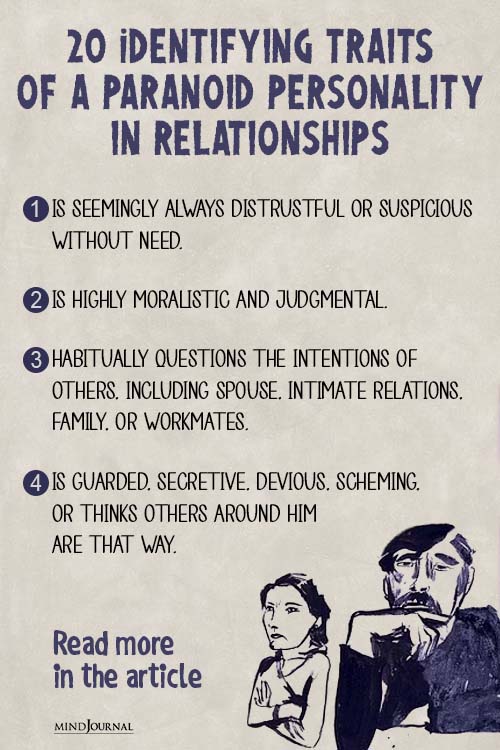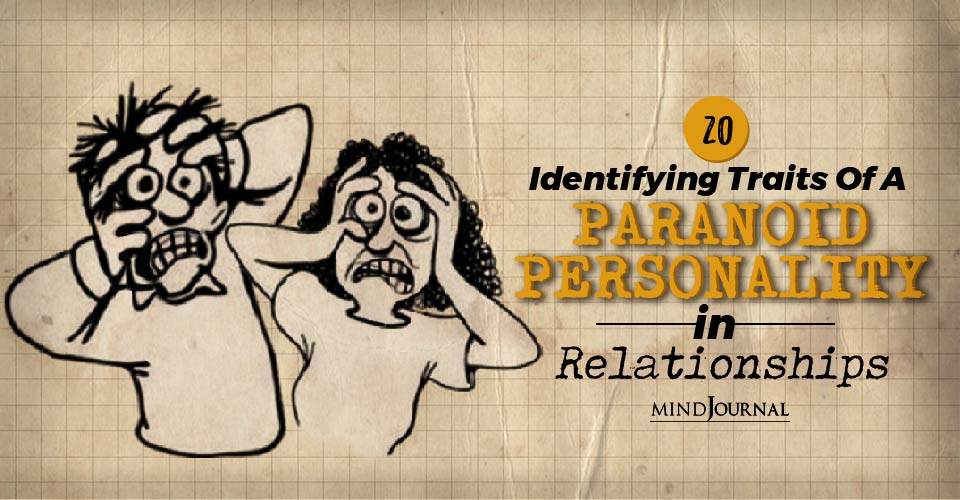People with paranoid personality disorder happen to suffer from acute distrust. Their unjustified suspicion and hesitancy to confide in others adversely affects their decision-making ability and relationships. Being in a relationship with a paranoid partner can lead to feeling emotionally drained and way more nervous and anxious.
After writing about eggshell relationships a few weeks back, I received an email from a woman I will call Sara. She had also read my book Dangerous Personalities and wondered why there were so many articles about narcissists, psychopaths, and borderline personalities, but very little written about being in a relationship with someone who is paranoid.
I couldn’t answer the why question, but she was right about the lack of written material written about those kinds of relationships. She had been in one for three years and she described the turmoil and unhappiness she endured but she wished “someone had warned me.”
The paranoid personality, in my experience, is often not talked about because it is often mistaken for other personality types or it is outright ignored as just being some form “eccentricity.” Even when I tell people to go back and see the 1999 movie American Beauty and examine closely Frank Fitts dealing with his wife and son, they struggle to understand that Fitts, in that movie, is a paranoid personality.
And that hell Mrs. Fitts was living, that left her silent, downcast, and emotionally dead, is because of him. But that is a movie and life is rarely that neatly packaged. Character disorders, after all, are on a continuum; some are more acute or pathological than others.
What stands out about the paranoid personality in relationships are the behaviors and how they make others feel. Over the years of researching my book, I collected the words that describe the paranoid personality based on what was reported by those who had lived with them or had been victimized by them. There is wisdom in their unfiltered words—the words of those who have lived it in vivo.
Here are some of the words, not all, that they used to describe this personality type from their experiences:
Angry, anxious, apprehensive, combative, complainer, contrarian, critical, delusional, demanding, difficult, distrustful, disturbed, eccentric, fanatic, fearful, fixated, fussy, guarded, hardheaded, inhospitable, intense, irrational, know-it-all, menacing, mentally-rigid, moralistic, obsessed, odd, offensive, opinionated, sensitive, peculiar, pedantic, quarrelsome, questioning, rigid, scary, strict, stubborn, suspicious, tense, threatening, tightly-wound, touchy, unforgiving, unhappy, vindictive, wary, watchful, withdrawn.*
When we hear these terms, it should make us take note. Do I know someone like this? Does this sound like my boyfriend or spouse? Have I sensed and felt this myself?
Words alone may not mean a lot, but in the aggregate, they give shape and form to help us understand something is wrong with the individual they describe—individuals who are, as Stuart Yudofsky, M.D., said, “flawed of character” (Yudoffsky 2005, 312-327).
When Sara started dating this man, she noticed some of the characteristics in the word list above but she either dismissed them, thought they would go away, or did not think they would affect her. She was wrong.
She didn’t know that the paranoid personality is stubborn; there is no pill you can take for it, and that those who live with someone who is paranoid pay a price—usually a high emotional price.

When we couple the words of the victims with the recognized behavioral traits of the paranoid personality, we get a better picture of these individuals. Had Sara known of these traits or what it would be like to live with a paranoid personality, she would have been more careful. “Honestly, I didn’t know one person in my circle of friends that knew anything about paranoia or the paranoid personality.”
Unfortunately, most people don’t know what to look for. But what if someone had sat down with Sara and said, look for these behaviors, examine how being around this person makes you feel? While it is too late for Sara, who has already lived this, it is not for the rest of us.
Behavioral Traits Of A Paranoid Personality
Consider the aforementioned words from the victims and examine these 20 behavioral traits that are often associated with the paranoid personality:
1. Is seemingly always distrustful or suspicious without need.
2. Is highly moralistic and judgmental.
3. Habitually questions the intentions of others, including spouse, intimate relations, family, or workmates.
4. Is guarded, secretive, devious, scheming, or thinks others around him are that way.
5. Is unbending in thoughts and ideas—stubbornly holds onto beliefs with rigid thinking.
6. Holds grudges for a long time and is not forgiving of slights, even after many years.
7. Is a chronic complainer and malcontent—never satisfied everything is above board or assumes something nefarious is at play.
Related: The 3 Types of Complainers You Should Stay Away From
8. Claims that past failings at work, life, or in relationships have been the direct fault of others.
9. Has a need to control family members or loved ones very strictly and may be very regimented.
10. Never seems to be happy—all too often is on edge, anxious, or irritated—there always seems to be a looming threat “out there.”
11. Strongly believes and constantly seeks evidence that others will eventually disappoint or take advantage of him.
12. Often has an unrelenting one-track mind about this or that issue which you also must see as an important issue.
13. Questions the loyalty and veracity of others, even loved ones, without basis or seeing hidden meaning in the comments made by others.
14. Becomes suspicious and questions family members or loved ones when they interact with neighbors, postal or delivery personnel, or benign strangers.

15. Sees pending or looming threats that others don’t seem to see, understand, or comprehend, as he does and insists that you see things his way also.
16. Since entering into a relationship with this individual you see fewer and fewer of your old friends or family members.
17. You find yourself having to account for your time when you are away from home.
18. This individual takes offense when you make calls, engage in conversations, email, or talk to others and he is not a participant.
19. Denigrates you or others as “foolish,” “naïve,” “stupid,” or uses some other form of ad hominem attack because his knowledge and understanding are so perfect.
20. Since entering into a relationship with this individual you are less happy, less outgoing, less social, or less confident; or you find you are more worried, nervous, anxious, or preoccupied with how he reacts to you.
Related: 11 Signs of Negative People
It is normal to be suspicious every once in a while, but not always. You don’t need a degree in psychology to know that there are issues with an individual that shows 10 or more of these signs. At those levels, there is a high degree of anxiety on this person’s part as well as distrust coupled with rigid thinking that in turn makes them toxic to be around.
These individuals lack tenderness and for them, there is no humor in life—everything is serious. These pervasive traits in no way make for a good, happy, healthy, and vibrant relationship. What Sara found was that it led to suspiciousness, distrust, constant questioning, a regulated and insular lifestyle, with increasing anxiety that gradually and insidiously ate away at her happiness. I know of no one who can be happy in a relationship like that.
If you are in a relationship with someone like this, that person needs help and so will you—from a licensed mental health professional. Keep in mind, this person, in all likelihood, will reject any kind of assistance or interference in their life and they may question your intentions or loyalty severely or become angry, even violent.
Many individuals suffering from post-traumatic stress often have many of these behavioral traits and they need help in spite of their reluctance to seek it. Getting help should be paramount.
While the list above is not a diagnostic tool, and should not be used that way, it can help you to be more attentive, sharpen your focus, or validate some of the behaviors you may be witnessing or experiencing. It is always wise to check with a mental health professional in these cases, and recognizing these chronic behaviors is a start.
People who have character flaws need to be treated with respect, dignity, and kindness and nothing here should take away from that. Having said that, always remember, as I often say, no matter what relationship you are in, you have no social obligation to be victimized, ever.
*From Chapter 4 in Dangerous Personalities (Rodale).
References:
Navarro, Joe. 2014. “Dangerous Personalities.” Rodale, New York: NY.
Yudofsky, Stuart C. 2005. “Fatal Flaws: Navigating destructive relationships with people with disorders of personality and character.” America Psychiatric Publishing, Inc. Arlington, VA.
Written By Joe Navarro
Originally Appeared In Psychology Today
Copyrights Owned By Joe Navarro
Having a paranoid partner is way more challenging than what people tend to believe, and sometimes, dangerous even. When you have a paranoid partner, you will constantly feel on the edge, and nervous about things going south. Is that really a way to love someone and be in a relationship? No matter how much you love your partner, you do not need to destroy yourself emotionally to sustain a relationship that does not have any future.












Leave a Reply